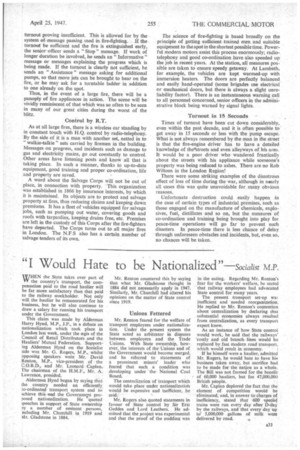"I Would Hate to be Nationalized"--socialist M.P.
Page 43

If you've noticed an error in this article please click here to report it so we can fix it.
WHEN the State takes over part of VV the country's transport, the compensation paid to the road haulier will be far more satisfactory than that paid to the railway stockholder. Not only will the haulier be remunerated for his business, but he will also continue to draw a salary for running his transport under the Government.
This claim was made by Alderman Harry Hynd, M.P., J.P., in a debate on nationalization which took place in London last week, under the wgis of the Council of Retail Distributors and the Hauliers' Mutual Federation. Supporting Alderman Hynd on the Socialist side was Mr. G. Rogers, M.P., whilst opposing speakers were Mr. David Renton, M.P., vice-president of the C.O.R.D., and Mr. Leonard Caplan:. The chairman of the H.M.F., Mt A. Lawrence, presided.
Alderman Hynd began by saying that the country needed an efficiently :o-ordinated transport system and to schieve this end the Governmecnt pro3osed nationalization. He quoted ipeeches in support of State ownership 3y a number of eminent persons, ncluding Mr. Churchill in 1919 and
AL Gladstone in 1884. * Mr. Renton countered this by saying that what Mr. Gladstone thought in 1884 did not necessarily apply in 1947. Similarly, Mr. Churchill had altered his opinions on the matter of State control since 1919.
Unions Fettered Mr. Renton feared for the welfare of transport employees under nationalization. Under the present system the State acted as arbitrator in disputes between employers and the Trade Unions. With State ownership, however, the interests of the Unions and of the Government would become merged, and he referred to statements of a prominent miners' leader who feared that such a condition was developing under theNational Coal Board.
The centralization of transport which would take place under nationalization would be expensive and inefficient, he said.
Mr. Rogers also quoted statements in favour of State control by Sir Eric Geddes and Lord Leathers. He admitted that the project was experimental and that the proof of the pudding was in-the eating. Regarding Mr. Renton's fear for the workers' welfare, he stated that railway employees had advocated State control for many years. The present transport set-up wat inefficient and needed reorganization. He replied to Mr. Renton's contention about centralization by declaring that substantial economies always resulted from centralization, as every transport expert knew.
As an instance of how State control would work, he said that the railways' costly and old branch lines would be replaced by fast modern road transport, which would result in economy.
If he himself were a haulier, admitted Mr. Rogers, he would hate to have his business taken away, but sacrifice had to be made for the nation as a whole. The Bill was not framed for the benefit of 60,000 hauliers, but for 47,000,000 British people.
Mr. Caplan deplored the fact that the element of competition would be eliminated, and, in answer to Charges of inefficiency, stated that 600 -special trains were run every day after D-day by the railways, and that every day up to' 5,000,000 gallons of milk were delivered by road.












































































